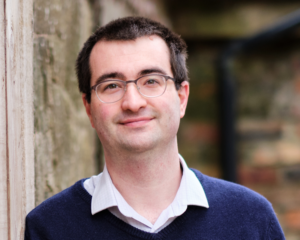 Dr David Nelson studied chemistry at the Universities of Edinburgh (MChem, 2008) and Strathclyde (PhD, 2012 with Prof. J. M. Percy). He was then a Research Fellow at the University of St. Andrews (2012-14 with Prof. S. P. Nolan) before taking up a Chancellor’s Fellowship at the University of Strathclyde (2014), where he was promoted to Senior Lecturer in 2018. He received a Bürgenstock Junior Scientists Programme Fellowship in 2019 and a Thieme Chemistry Journals Award in 2020. David joined the editorial board of Communications Chemistry in 2020.
Dr David Nelson studied chemistry at the Universities of Edinburgh (MChem, 2008) and Strathclyde (PhD, 2012 with Prof. J. M. Percy). He was then a Research Fellow at the University of St. Andrews (2012-14 with Prof. S. P. Nolan) before taking up a Chancellor’s Fellowship at the University of Strathclyde (2014), where he was promoted to Senior Lecturer in 2018. He received a Bürgenstock Junior Scientists Programme Fellowship in 2019 and a Thieme Chemistry Journals Award in 2020. David joined the editorial board of Communications Chemistry in 2020.
David and his team use tools and techniques from physical (in)organic, organometallic, organic and computational chemistry to understand reaction mechanisms and structure/reactivity relationships in homogeneous catalysis mediated by transition metal complexes. Current areas of focus include nickel-catalysed cross-coupling reactions and iridium-catalysed C-H activation reactions.
Read his Emerging Investigator article “Are rate and selectivity correlated in iridium-catalysed hydrogen isotope exchange reactions?” and read more about his in the interview below:
How do you feel about Catalysis Science & Technology as a place to publish?
I’ve always found publishing with the journal to be quite painless. The review process is smooth, the tracker is excellent (and provides more/more up-to-date information than other publishers do), and we’ve always had constructive comments from reviewers and editors that have allowed us to improve our manuscripts.
What aspect of your work are you most excited about at the moment and what do you find most challenging about your research?
We are really interested in understanding reaction mechanisms and how this understanding can be used to optimise reaction conversion and selectivity, and to make reactions more efficient. I really enjoy working with reactions where there is a lot to discover, and where there are still some big questions to be answered. It’s often quite challenging to move beyond empirical observations of “this reaction gives X% yield” or “this is the order of reactivity” to truly understand why this is observed.
In your opinion, what are the most important questions to be asked/answered in this field of research?
For C-H activation I think, depending on the specific reaction, there still remain some challenges around decreasing catalyst loadings and around understanding and predicting selectivity. When I teach C-H activation to our undergraduates I like to point towards iridium-catalysed C-H borylation as an excellent reaction that’s widely used across academia and industry, exactly because we can often work at reasonably low catalyst loadings and predict selectivity quite reliably.
Can you share one piece of career-related advice or wisdom with other early career scientists?
Advice is always tricky to give out, because everyone has a different experience of life and a different career path, but I would encourage early career scientists to consider empathy as an important attribute. It’s always worth considering things from multiple perspectives, when you interact with people directly or indirectly: your students, senior colleagues, technical staff, reviewers, the authors of the papers and grants you review, and so on. What would you want from that interaction, if you were in their shoes? What else might they be dealing with?
Keep up to date with David and his research by following his Twitter @TheNelsonGroup










